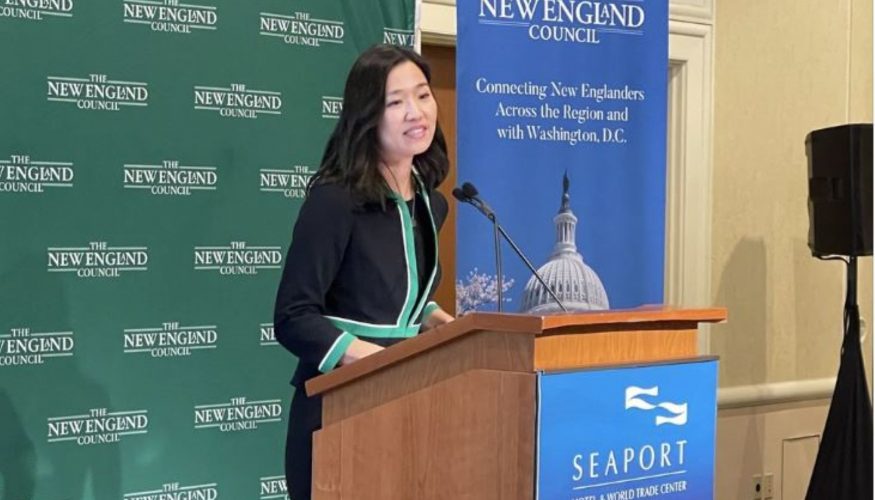Mayor Michelle Wu asks Greater Boston biz leaders to partner on transit, housing, workforce development

By Benjamin Kail, Boston Business Journal
Boston Mayor Michelle Wu on Wednesday asked the region’s business, nonprofit and academic leaders to partner on rebuilding the city’s depleted workforce, bolstering affordable housing and overhauling public transit to keep the city competitive.
With most experts expecting a slowdown in 2023 and business and government leaders statewide eyeing ways to keep and draw talent here, Wu told more than 500 gathered at the Seaport Hotel in a New England Council breakfast that there’s essentially good news and bad news.
Boston’s unemployment rate has dipped to pre-pandemic levels, at below 3% as of December, the mayor said. There are also signs of recovery in hospitality and other sectors hit hard by Covid-19, along with gains in healthcare, professional services and life sciences.
But the workforce challenges mirror national trends: the most recent estimate shows the regional workforce is nearly a quarter-of-a-million people short of February 2020, at least a 2.5% decline, Wu said. Ten percent of the city’s office spaces sit vacant, and interest rates are spiking building costs, undercutting housing goals in a region that urgently needs more affordable housing.
“So, at a time when more people can work from wherever they want, and every industry is looking to fill vacancies — itʼs our job to make Boston, and New England — the place people want to be,” Wu said.
Wu described the combined crises in housing and transit as “the biggest threat to our region’s economy.” She touted her administration’s moves that have effectively halved the time it takes to get affordable housing projects approved, from 11 months to five, and said more studies and programs are underway to further streamline the process.
She told business leaders the city must “make walking, biking and public transit the first choice for your employees, customers and partners across the region.”
She noted that last week, U.S. Transportation Secretary Pete Buttigieg called her to let her know the city will receive $9 million in Safe Streets grants to “help reconstruct our most inaccessible, most dangerous intersections … from Andrew Square to Orient Heights, Codman Square to Bowdoin Geneva, Blue Hill Ave, Roxbury and Chinatown.”
“But to fully realize our potential … we must have more reliable public transit to get cars off the roads,” she added. “Commuters can’t be waiting 10 minutes for the next train at peak rush hour in a world-class city. And we won’t rest until we get the resources we need to be able to build a system our residents and workers deserve, including a Boston seat on the MBTA board. I ask for your continued partnership and advocacy for the resources and political will to prioritize public transportation as a make or break issue for our region.”
Priscilla Simms Brown, president and CEO of Amalgamated Bank, the New York-based, union-owned institution that sponsored the breakfast and opened an office in Boston in 2021, said Wu’s pro-climate, pro-labor and other progressive policies make the region a great home for the bank’s employees.
Pushing toward divestment of fossil fuels, tobacco and private prison industries, and enacting policies that make all new city construction and major renovations of schools, municipal buildings and public housing fossil fuel-free, “puts us on a path to sustainability,” Simms Brown said.
Wu sets aggressive summer jobs program goal
Wu’s remarks echoed some of Gov. Maura Healey’s recent comments to hundreds of business leaders at a recent event hosted by the state’s largest business association, the Associated Industries of Massachusetts. Healey pledged to implement tax reforms to make the state more attractive, while making investments in housing, workforce development, green energy and public transit.
To help build the workforce of the future, Wu asked the business executives, nonprofit and academic leaders to deepen their engagement with the city’s summer jobs program.
She said city officials traditionally set a goal of helping 5,000 young people in Boston find work every summer, but that the application and placement processes have limited its reach to about 2,500.
“The summer jobs process needs to be tightened up a whole lot,” she said. “And that is what our team is working on this year. Last summer, we set a goal of 6,000 … and we went from kind of plateauing at 2,500 to 3,500 young people participating. We are looking to at least double that this summer.”
Wu said when she visits classrooms and asks students what they want to do and learn, they often say they don’t want “to be just sitting around behind the counter somewhere or doing a retail job over the summer.”
“They want to be in your offices and organizations making the difference and having an impact,” she said. “And so we’re putting together a more comprehensive and supporting program than ever before, and we really ask for you to participate in that.”